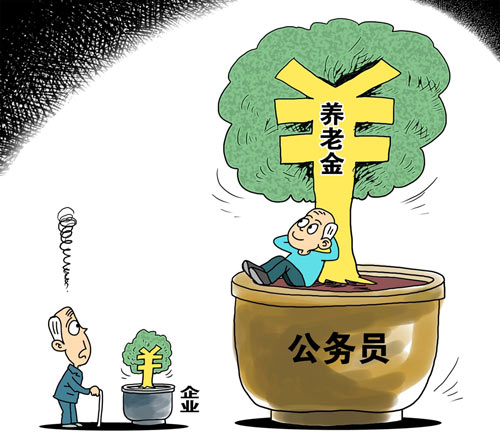Expert: China resolves on pension system reform
- By Wu Jin
 0 Comment(s)
0 Comment(s) Print
Print E-mail China.org.cn, November 19, 2013
E-mail China.org.cn, November 19, 2013
The Central Committee of the Communist Party of China (CPC) plans to reform the two-track pension system and bridge the yawning gap in the welfare system for the upcoming graying society.
The plan was part of "The Decision" made a few days after the Third Plenum of 18th CPC Central Committee, which closed on Nov. 12.
|
|
|
China plans to reform the two-track pension system and bridge the yawning gap in the welfare system for the upcoming graying society. [file photo] |
According to "The Decision," the country will forge an overall insurance system based on an actuarial balance.
China's pension system currently runs down two tracks. One is for government officials and employees from state-run institutions; the other is for the rest of the employees. In the current system, those who work for the government or state-run institutions are exempted from paying for their pensions.
However, their post-retirement incomes usually maintain 80 to 90 percent of their previous salaries. Meanwhile, the rest of the employees, who need to hand over about 8 percent of their salaries for pension, could only receive 40 to 60 percent of their salaries after retirement.
"The reform of the pension system for government officials and employees from state-owned institutions should not only be considered a matter of social insurance reform, but also a matter regarding the Party's governing capacity and social stability," said Jin Weigang, director of the Social Security Department with the Ministry of Human Resources and Social Security.
According to Jin, because of the imbalanced regional economies and local fiscal revenues, it is very difficult to build an overall pension system in China. Nonetheless, the reform is urgent; otherwise the inequality gap will continue to widen.
Jin said that to achieve the goal, it requires unified pension insurance policies and a rudimentary resolution on the social security of migrant people.
Migrant people are among those who gain the least from the pension system because of their unstable living conditions as well as their unwillingness to be charged.
"Therefore, we have to set up a stimulus system to distribute more pensions to those who are willing to pay more," Jin said.
China initiated a reform of the pension system for government officials and employees from the state-run institutions across five provinces and municipalities, including Guangdong, Shanghai and Shanxi, in 2008. Yet thus far the reform has been met with strong resistance and has achieved very little progress.







Go to Forum >>0 Comment(s)